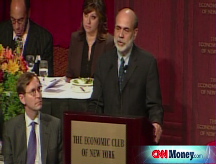Bush defends bailout
President explains intervention in financial system as necessary to prevent a wider crisis.
NEW YORK (CNNMoney.com) -- President Bush on Friday defended recent federal intervention in the financial system as necessary to ward off a wider economic crisis and said the actions were not just a Wall Street bailout.
"People look at the crisis and say, 'Oh, it's only Wall Street,' " said Bush, addressing the U.S. Chamber of Commerce. "I don't think so. In fact, I know that if we had not acted, it would have affected the American people directly."
"If the government had not acted, the hole in our financial system would have gotten larger," he added.
Bush's comments - his 34th public statement on the economic crisis since the collapse of Lehman Brothers in mid-September - came just minutes after the Commerce Department reported that initial construction of U.S. homes fell to a fresh 17-year low in September. Housing starts fell to 817,000 residential units, down 6.3% from 872,000 housing starts the prior month.
Wall Street got off to another rough start on Friday, with the Dow falling more than 200 points. Stock prices have been highly volatile. This week alone, the Dow Jones had its second biggest daily point gain and second biggest drop ever.
Of the many recent measures that the U.S. government has taken to address the ongoing economic crisis - and the credit freeze in particular - the most sweeping is the $700 billion in newly approved funding that will be used, in part, to invest in banks and buy bad mortgage assets. The aim is to free up the major banks to lend once again.
Bush said the government would limit its intervention in size and scope, and did not intend to nationalize the banking system. "The government intervention is not a government takeover," he said.
Nevertheless, the government has taken a 79.9% stake in battered insurance giant American International Group (AIG, Fortune 500), in exchange for its initial $85 billion credit line granted on Sept. 16. On Oct. 8, the Federal Reserve extended an additional credit line of $37.8 billion to the company, for a total of $122.8 billion. So far, AIG has tapped $82.9 billion of the emergency funding.
The first big government intervention occurred on Sept. 7, when Treasury Secretary Henry Paulson and James Lockhart, director of the Federal Housing Finance Agency, extended as much as $200 billion to save Fannie Mae (FNM, Fortune 500) and Freddie Mac (FRE, Fortune 500).
This action, essentially a taxpayer-funded government takeover, was intended to prevent the collapse of these spiraling mortgage giants, which own or back more than $5 trillion worth of mortgage debt, or about half the mortgage debt in the country. ![]()


